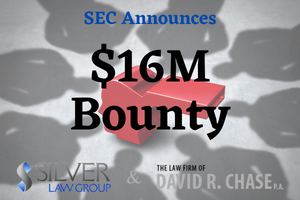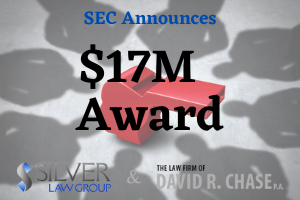 The U.S. Securities and Exchange Commission has recently ratcheted up enforcement of insider trading cases, announcing investigations against ten people in four different cases in July. The headline-grabbing case involves a former Coinbase manager, his brother, and a friend alleging a scheme to trade the cryptocurrency ahead of announcements that crypto assets would be available for trading. Continue reading
The U.S. Securities and Exchange Commission has recently ratcheted up enforcement of insider trading cases, announcing investigations against ten people in four different cases in July. The headline-grabbing case involves a former Coinbase manager, his brother, and a friend alleging a scheme to trade the cryptocurrency ahead of announcements that crypto assets would be available for trading. Continue reading
Companies Under Pressure To Commit Securities Fraud
 We hear about securities fraud when a big case comes along. Hollywood often mythologizes the topic in movies like The Wolf of Wall Street. But these headline-grabbing stories don’t tell the full story. Companies are often under immense pressure to meet market expectations.
We hear about securities fraud when a big case comes along. Hollywood often mythologizes the topic in movies like The Wolf of Wall Street. But these headline-grabbing stories don’t tell the full story. Companies are often under immense pressure to meet market expectations.
On the Bloomberg Law podcast, UCLA Law School professor James Park recently discussed his new book “The Valuation Treadmill: How Securities Fraud Threatens the Integrity of Public Companies.” The book covers the pressures that U.S. companies face to commit securities fraud. Continue reading
Fraudulent Sales Pitches By Stockbrokers
 When the Securities and Exchange Commission (SEC) warns investors of types of investment scams—such as boiler room and Ponzi schemes—the agency routinely mentions the high-pressure aggressive sales tactics scammers rely on to help defraud their customers. So let’s look at some techniques that fraudsters are using: Continue reading
When the Securities and Exchange Commission (SEC) warns investors of types of investment scams—such as boiler room and Ponzi schemes—the agency routinely mentions the high-pressure aggressive sales tactics scammers rely on to help defraud their customers. So let’s look at some techniques that fraudsters are using: Continue reading
Tech Insiders Are Coming Forward As SEC Whistleblowers
 As reported in the Wall Street Journal, employees of tech companies in Silicon Valley and elsewhere are increasingly coming forward to the Securities and Exchange Commission (SEC). These employees-turned-SEC whistleblowers are explaining how their companies are overpromising and underdelivering or otherwise violating the federal securities laws. Continue reading
As reported in the Wall Street Journal, employees of tech companies in Silicon Valley and elsewhere are increasingly coming forward to the Securities and Exchange Commission (SEC). These employees-turned-SEC whistleblowers are explaining how their companies are overpromising and underdelivering or otherwise violating the federal securities laws. Continue reading
Life Settlement Funds— Defrauding Seniors And Investors
 In recent years, many investors have been looking for new ways to invest. One way funds have been doing that is by pooling a type of asset or debt into an investment fund. Ownership of the pool is sold as shares, with profits to be allocated between the shareholders if the pool’s assets increase in value. One such category of these pooled asset investments is “life settlement funds,” but the Securities and Exchange Commission (SEC) and others are warning that many of these funds are a scam. Continue reading
In recent years, many investors have been looking for new ways to invest. One way funds have been doing that is by pooling a type of asset or debt into an investment fund. Ownership of the pool is sold as shares, with profits to be allocated between the shareholders if the pool’s assets increase in value. One such category of these pooled asset investments is “life settlement funds,” but the Securities and Exchange Commission (SEC) and others are warning that many of these funds are a scam. Continue reading
SEC Amends Rules To Whistleblower Program
 The SEC recently announced two amendments to their Whistleblower program rules that will make coming forward a little more lucrative for interested individuals.
The SEC recently announced two amendments to their Whistleblower program rules that will make coming forward a little more lucrative for interested individuals.
The first amendment to Rule 21F-3 allows the SEC to pay bounties to whistleblowers for actions brought by other federal agencies. This is particularly helpful when the action would lead to the award being paid by the other entity’s own whistleblower program. Continue reading
Two SEC Whistleblowers Receive $16M Bounty From SEC Whistleblower Program
 Once again, two SEC whistleblowers will receive bounties through the SEC’s Office of the Whistleblower, following a successful enforcement action.
Once again, two SEC whistleblowers will receive bounties through the SEC’s Office of the Whistleblower, following a successful enforcement action.
The first SEC whistleblower receives $13 million after voluntarily providing information that initiated the investigation. They notified SEC staff of the firm’s “abusive practices” for several years prior to the opening of the investigation. Continue reading
Ten Years: Celebrating National Whistleblower Day
 In this blog, we often discuss the financial bounties that whistleblowers receive from the US Securities & Exchange Commission (SEC) and occasionally, the Commodities Futures Trading Commission (CFTC.) What isn’t always discussed is the time and effort that it takes for a whistleblower to get to that point. Continue reading
In this blog, we often discuss the financial bounties that whistleblowers receive from the US Securities & Exchange Commission (SEC) and occasionally, the Commodities Futures Trading Commission (CFTC.) What isn’t always discussed is the time and effort that it takes for a whistleblower to get to that point. Continue reading
Scott Silver And David Chase Selected As Top Rated Securities Litigation Attorneys By Super Lawyers 2022
 Scott Silver and David Chase were selected as top-rated securities litigation attorneys by Super Lawyers for 2022. Scott received the same award in 2021, and was previously selected for Super Lawyers’ Rising Stars list. David Chase was selected to Super Lawyers for years 2006-2007, 2009-2019, and 2021-2022. Continue reading
Scott Silver and David Chase were selected as top-rated securities litigation attorneys by Super Lawyers for 2022. Scott received the same award in 2021, and was previously selected for Super Lawyers’ Rising Stars list. David Chase was selected to Super Lawyers for years 2006-2007, 2009-2019, and 2021-2022. Continue reading
SEC Awards $17M Bounty To Whistleblower
In a recent press release , the SEC announced that it has awarded an individual a bounty of $17 million for their assistance as a whistleblower.
, the SEC announced that it has awarded an individual a bounty of $17 million for their assistance as a whistleblower.
The individual provided information that led to the SEC opening an investigation. Additionally, the individual gave continued assistance to SEC staff, speaking with them on multiple occasions. Continue reading
 SEC Whistleblower Lawyer Blog
SEC Whistleblower Lawyer Blog

